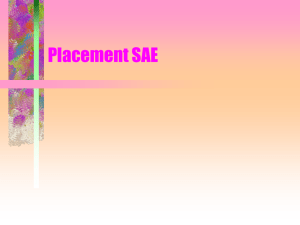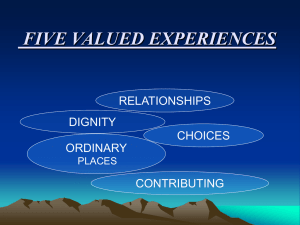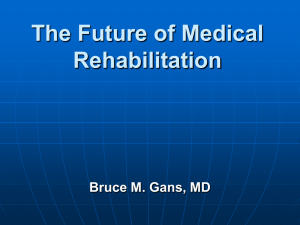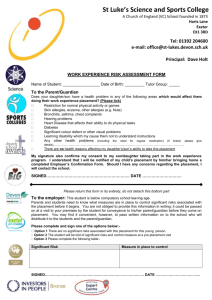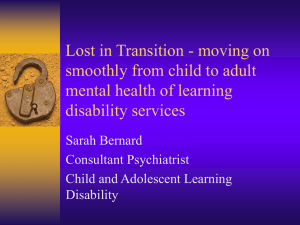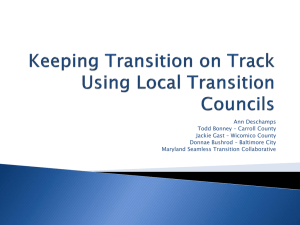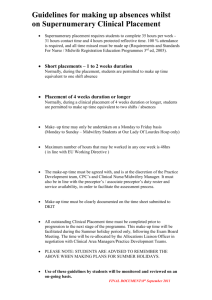Job Development & Placement - Southern University, Baton Rouge
advertisement
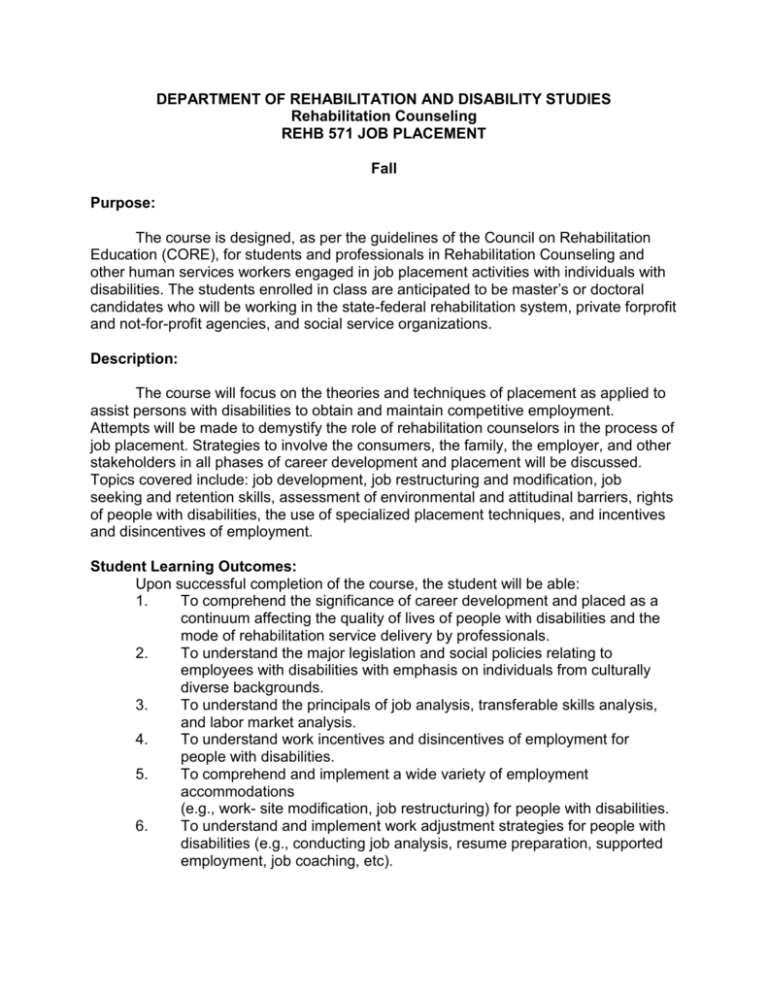
DEPARTMENT OF REHABILITATION AND DISABILITY STUDIES Rehabilitation Counseling REHB 571 JOB PLACEMENT Fall Purpose: The course is designed, as per the guidelines of the Council on Rehabilitation Education (CORE), for students and professionals in Rehabilitation Counseling and other human services workers engaged in job placement activities with individuals with disabilities. The students enrolled in class are anticipated to be master’s or doctoral candidates who will be working in the state-federal rehabilitation system, private forprofit and not-for-profit agencies, and social service organizations. Description: The course will focus on the theories and techniques of placement as applied to assist persons with disabilities to obtain and maintain competitive employment. Attempts will be made to demystify the role of rehabilitation counselors in the process of job placement. Strategies to involve the consumers, the family, the employer, and other stakeholders in all phases of career development and placement will be discussed. Topics covered include: job development, job restructuring and modification, job seeking and retention skills, assessment of environmental and attitudinal barriers, rights of people with disabilities, the use of specialized placement techniques, and incentives and disincentives of employment. Student Learning Outcomes: Upon successful completion of the course, the student will be able: 1. To comprehend the significance of career development and placed as a continuum affecting the quality of lives of people with disabilities and the mode of rehabilitation service delivery by professionals. 2. To understand the major legislation and social policies relating to employees with disabilities with emphasis on individuals from culturally diverse backgrounds. 3. To understand the principals of job analysis, transferable skills analysis, and labor market analysis. 4. To understand work incentives and disincentives of employment for people with disabilities. 5. To comprehend and implement a wide variety of employment accommodations (e.g., work- site modification, job restructuring) for people with disabilities. 6. To understand and implement work adjustment strategies for people with disabilities (e.g., conducting job analysis, resume preparation, supported employment, job coaching, etc). 6. To develop a placement plan incorporating consumer characteristics and labor market information. 7. To understand effective methods of developing successful partnerships with business community to facilitate placement. 8. To demonstrate knowledge of current research and issues affecting the placement process in rehabilitation. Textbooks: Bissonnette, D. (1994). Beyond traditional job development: The art of creating opportunity. Granada Hills, CA: Milt Wright and Associates. Pimentel, R. (2001). Working with people with disabilities in a job placement/job retention environment. Granada Hills, CA: Milt Wright and Associates. Websites: W. E. Upjohn Institute http://www.upjohninst.org/ U.S. Bureau of Labor Statistics http://www.upjohninst.org/ Journal of Rehabilitation http://findarticles.com/p/articles/mi_m0825/ http://www.nationalrehab.org/website/pubs/index.html Cornell University, ILR School, Disability and Employment Institute http://www.ilr.cornell.edu/edi/p-eprrtc.cfm Rehabilitation Research and Training Center on Workplace Support and Job Retention http://www.worksupport.com/ Job Accommodation Network http://www.jan.wvu.edu/ Rehabilitation Research and Training Center on State Support and Employment http://www.communityinclusion.org/project.php?project_id=24 Southwest Disability and Business Technical Assistance Center http://www.dlrp.org/ National Center for Dissemination of Rehabilitation Research http://www.ncddr.org/ Grading: Final grade will be composed of: A. Class Attendance and Participation: All students must attend classes following SUBR policy and actively participate in class discussion on assigned readings and related course materials. B. Two-Page Abstract: Compile one abstract from two journal articles related to changing face of job development and placement in congruence with legislative developments since 1998. The articles MUST be published in professional refereed journals in or after 2004. Articles from non-refereed journals are NOT accepted. Please enclose highlighted copies of both articles with the abstract (15 points). C. Job analysis: Complete two job analyses (25 points each = 50 points). D. Two quizzes: will contain materials taught since the last quiz (30 points each = A total of 60 points). E. Five-Page Paper: Write a paper following the APA 5th Edition style on job placement issues related to one type of disability. In doing so, please select at least one model of job placement that may be application to the target population. Please enclose highlighted copies of all sources used for the paper (40 points). F. Ten-Minute Individual Presentation of Assigned Readings: Make a presentation on assigned chapter(s) from textbooks accompanied with MS Powerpoint slides (25 points). G. Transferable Skills Analysis: using http://www.vocrehab.com/ and the practice case information. Username and password will be given to each student in class (20 points). H. Labor Market Analysis: must be completed in one of the industries in and around Baton Rouge that hires persons with disabilities. Please follow the attached detailed guideline (20 points). I. Mid-Term and Final examinations: will be comprehensive (40 points each = 80 points). J. Emulation of a Rehabilitation Counselor Role Model: Adhere to the ethical principles of the Commission on Rehabilitation Counselor Certification (CRCC). Grading Scale: 90% (288 or above) = A 80% (256 - 287) = B 70% (224 - 190) = C 60% (192 - 223) = D 59% (191 or below) = F Accommodations for Students with Disabilities: The Office of Students with Disabilities located in Room 239 of A. C. Blanks Hall. Please contact Ms. Patricia Hebert, Director for future assistance; Phone: 771-3950; Fax: 771-2959; and E-mail: prhebert@cox.net Livetext Subscription: Southern University and A&M College-Baton Rouge has entered into partnership with LiveText, Inc. to provide online academic resources for student collaboration and learning outcomes assessment. Therefore, all students enrolled in this course are required to purchase a subscription from LiveText, Inc. through the Southern University Bookstore. LiveText, Inc. provides students with the electronic tools and services needed to serve them in their courses and in their career or academic pursuits beyond graduation. LiveText is a dynamic tool that will enable you to: • Create Electronic Portfolios for storing and displaying coursework for use anytime and anyplace; • Share your résumés, professional portfolios and virtually any projects that can be photographed, video recorded, and uploaded to prospective employers and others who need or want to know about your accomplishments; • Engage in discussion boards with other students, exchange feedback, and create study groups and other types of social networks. • Complete assignments in key/required courses where LiveText has been embedded (without LiveText, you will not be able to complete these assignments). • Create a complete record of your academic career that is malleable and easily accessible. • Engage in developing a results driven culture of assessment at Southern University. • Participate in a process that will allow for data-driven curricular improvements that foster improved student learning and performance. Administrative Requirements: 1. Attendance per university requirements. You are allowed to miss TWO classes without penalty. After that each absence will be penalized by 5% deduction of your final score in this course. Coming late to class or leaving the class early (15 minutes or more) is counted as absence. 2. If you miss a class, you will not get any point for the quiz and/or student presentation given in that class. Permission to take make up exams and deliver student presentation will be based on the student’s ability to substantiate the need to do so. However, the final decision will be made by the instructor. 3. Assignments are to be turned in by the due date. Late assignments will be worth 10% less per week of the total grade for that assignment. 4. All cellular phones must be turned off or put on vibration during the class. 5. During quizzes and exams, no one can leave the room without prior permission from the examiner. Class: Monday 5:00 PM - 7:50 PM Room 304 Blanks Hall Instructor: Alo Dutta, Ph.D., CRC, M.P.A. Assistant Professor, DRDS 233 Blanks Hall Baton Rouge, LA 70813 Phone: 225-771-00473020/2667 Fax: 225-771-2293 E-mail: alodutta1992@aol.com Office hours: 2:00 PM - 3:00 PM Wednesdays 2:00 PM - 4:00 PM Thursdays and Fridays (or by appointment) DEPARTMENT OF REHABILITATION AND DISABILITY STUDIES Rehabilitation Counseling REHB 571 JOB PLACEMENT Class Schedule Fall Dr. Alo Dutta Week 1 Introduction The Student Self-Administered Systems Approach to Placement Overview of Work and Placement Process Discussion of Assigned Reading Bissonnette (1994) Chapter 1 Rising to the Challenge Pimental (2001) Chapter 1 Understanding Disability Week 2 Social and Legislative Trends in Vocational Rehabilitation Discussion of Assigned Reading Bissonnette (1994) Chapter 2 Questioning Convention: New Paradigms in Job Placement Pimentel (2001) Chapter 2 Evaluating and Setting Placement Goals Week 3 Quiz I HIPAA: An Overview Guest Lecturer: Ms. Antonia Hamilton, PPS Coordinator Healthsouth Rehabilitation Hospital, Baton Rouge, LA Week 4 Labor day Week 5 Models of Job Placement Discussion of Assigned Reading Bissonnette (1994) Chapter 3 Creating Jobs with Employment Proposals Pimentel (2001) Chapter 3 Understanding the Employer’s Perspective Hand in 2-Page Abstract Week 6 Job Analysis Transferable Skills Analysis Motion and Time Measurement Discussion of Assigned Reading Bissonnette (1994) Chapter 4 Capitalizing on Business and Social Trends Pimentel (2001) Chapter 4 The Hire Week 7 Mid-Term Examination Week 8 Barriers and Accommodations in the Workplace Enhancing Job Seeking Skills Discussion of Assigned Reading Pimentel (2001) Chapter 5 Employee Job Retention Student Presentation on Assigned Reading Bissonnette (1994) Chapter 5 Developing Partnerships with Employers Chapter 6 Targeting New Employers Week 9 Student Presentation on Assigned Reading Bissonnette (1994) Chapter 7 Initiating Contact with Employers Chapter 8 Understanding Employer Needs Labor Market Analysis Occupational Information Worker’s Qualification Profile Guest Lecturer: Dr. Michael Welch Human Services Foundation, Baton Rouge, LA Hand in Job Analysis I Week 10 Quiz II Incentives and Disincentives of Employment Week 11 Student Presentation on Assigned Reading Bissonnette (1994) Chapter 9 Communicating with Employers: Language as Art Worker’s Compensation Guest Lecturer: Mr. Steve Deist, President Deist and Associates, Baton Rouge, LA Hand in Transferable Skills Analysis Week 12 Job Retention and Natural Support Projects with Industries Discussion of Assigned Reading Bissonnette (1994) Chapter 10 Resolving Employer Concerns Hand in Job Analysis II Week 13 Discussion of Assigned Reading Bissonnette (1994) Chapter 11 Providing Quality Service to Employers Week 14 Review for Final Examination Hand in Five-Page Paper Week 15 Hand in Labor Market Analysis Week 16 Final Examination

